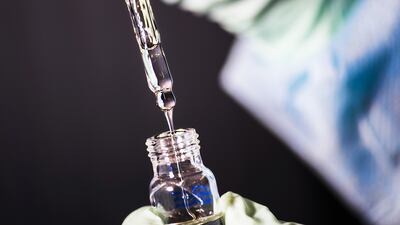Vaccination has emerged as one of the most critical tools in modern medicine, not only for individual health but also for sustaining global public health and economic stability. One of the most common vaccine-preventable deaths worldwide is pneumococcal disease with the majority of deaths occurring in developing countries.
Global and regional experts, researchers, and healthcare leaders recently discussed the powerful role of vaccines in reducing the burden of infectious diseases that cause respiratory illnesses, including respiratory syncytial virus (RSV), pneumococcal diseases, and Sars Cov2, during the Pfizer Middle East, Russia and Africa Vaccine Summit, in Dubai.
Dr Iona Munjal, executive director of Pfizer vaccine clinical research and development, said: "By preventing illnesses before they occur, immunisation not only saves lives but also strengthens healthcare systems and drives economic growth. It empowers individuals to lead healthier lives, supports workforce productivity, and reduces the burden on healthcare systems. This is particularly important in combating diseases like RSV and pneumococcal infections, which can have a devastating impact on public health, especially on vulnerable populations."
Vaccines to address antimicrobial resistance
Antimicrobial resistance (AMR) poses a global health threat, undermining the effectiveness of antibiotics and making infections harder to treat. Vaccination plays a pivotal role in combating AMR by preventing infection that would otherwise require antibiotic treatment, thereby reducing the misuse and overuse of these vital medicines. A report by the World Health Organisation found vaccines against 23 pathogens could decrease the number of antibiotics needed by 22 per cent. Vaccines have also been estimated to prevent more than half a million deaths associated with AMR around the world annually.

Dr Nawal Al Kaabi is a paediatric infectious disease consultant at Sheikh Khalifa Medical City in Abu Dhabi and chairperson of the prevention and control of infection committee at health services company Seha.
She highlighted the role of vaccines in the region, noting that they are indispensable to address regional health challenges. “In a region characterised by high population density and extensive international travel, the risk of spreading respiratory diseases is elevated. Immunisation protects the most vulnerable groups by preventing severe cases and reducing antibiotic use and hospitalisations,” she said.
Protecting Vulnerable Groups
High-risk population immunisation focuses on protecting individuals who are more vulnerable to severe outcomes from infectious diseases. This includes older adults, individuals with chronic health conditions, infants, pregnant women, immunocompromised patients and underserved communities. Tailored immunisation strategies for these groups help prevent complications, reduce hospitalisations and save lives.
For infants, vaccinations are a crucial foundation for health, sometimes beginning even before birth. Through maternal immunisation, vaccines protect vulnerable infants and children by preventing life-threatening diseases as early as their first breath. This approach provides immunity to babies during their first months of life when they otherwise would be too young for a direct vaccination. Similarly, vaccines ensure older children are protected from potentially fatal diseases during the early years of life.
A legacy in vaccine development
Pfizer's commitment to vaccines dates back over a century, marked by innovative strides in immunology and public health. The company’s work extends from helping eradicate smallpox and developing the breakthrough mRNA Covid-19 vaccine to creating vaccines for pneumococcal disease, meningococcal disease, and RSV via maternal immunisations.

In the Middle East and Africa region, Pfizer works closely with local healthcare systems and government bodies to address pressing health challenges.
Dr Hammam Haridy, Pfizer MERA senior director of regional medical and scientific affairs for vaccines and anti-virals, stressed Pfizer’s focus on regional collaboration.
He said: “Our work in the region focused on reducing the burden of infectious diseases and decreasing the use of antibiotics for several life-threatening illnesses. Through initiatives like the MERA Vaccine Summit, we aim to collaborate with regional healthcare providers to raise awareness about the importance of vaccination and help protect vulnerable groups.”
Advancing immunisation for a healthier tomorrow
Innovations in immunisation continue to reshape the future of public health, harnessing cutting-edge technologies and scientific breakthroughs to combat infectious diseases more effectively than ever before. From mRNA advancements to maternal immunisation and beyond, these innovations are not only expanding the possibilities of disease prevention but also creating faster, more adaptable solutions for global health challenges.
“The next generation of vaccines is transforming the ways we approach disease prevention. With ongoing advancements, we are not only protecting individuals but also building a foundation for more resilient healthcare systems in the region,” said Pfizer's Dr Munjal.

